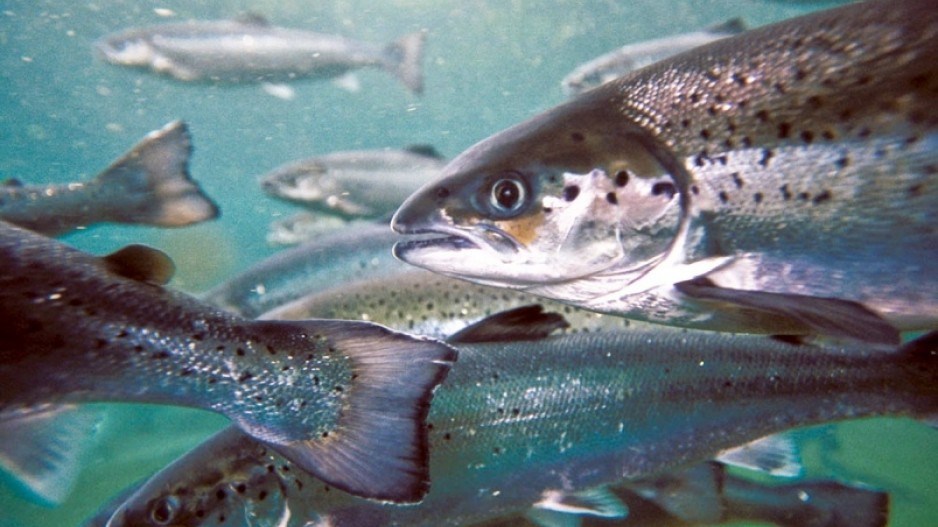(This story has been updated with clarification on the recent court ruling over the testing of farmed fish for PRV. Also, one of the papers cited was published in Scientific Reports, not Nature, although it appears on Nature's website.)
When a special federal science panel last month announced that a peer review of the science around piscine reovirus (PRV) suggested the strain of PRV found in B.C. was benign, it provided no documentation to back up the claim.
But two new published studies now confirm what the panel assembled by the Canadian Science Advisory Secretariat (CSAS) concluded: the strain of PRV found in B.C. fish appears to be apathogenic.
Independent researcher Alexandra Morton has pointed to research, including her own, that suggests that PRV causes, or is at least associated, with heart and skeletal muscle inflammation (HSMI) in farmed salmon. She has been using that possible link to try to shut down open net salmon farming in B.C., since diseased fish in open net fish farms could pass on diseases to wild stocks.
Research funded by the Strategic Salmon Health Initiative has also suggested a link between PRV and jaundice in Chinook salmon. And studies in Norway have drawn strong links between PRV and HSMI in Atlantic salmon in Norway.
But a number of studies here in Canada suggest that the strain of PRV found in B.C., both in farmed and wild salmon, may be a different, less virulent strain that appears to cause little, if any, harm to fish.
Not all viruses cause disease, and there can be variations in strain. Two new recent studies found little evidence that fish subjected to high viral loads of PRV developed symptoms of disease.
One study, published in Scientific Reports, was conducted by scientists from the Pacific Biological Station and the provincial government’s Animal Health Centre.
Among other things, that study points to other studies that found microscopic features of HSMI – one marker of which is heart lesions – were identified in fish that were not infected with PRV.
“Consequently, if HSMI diagnosis is based solely on histopathological heart lesions which can occur in the absence of PRV, then PRV cannot be assumed to be the causative agent of the disease, but rather one of multiple stand-alone or synergistic putative factors,” the study says.
Another study, published in Frontiers in Physiology, was conducted by scientists at the University of BC and the Pacific Biological Station.
In that study, Atlantic salmon that were free of PRV were then exposed to high levels of PRV virus. Their respiratory performance was then tested. A control group of PRV-free salmon was also tested.
Mild symptoms of HSMI were found in both control groups – i.e. salmon with high PRV infection and salmon without PRV infection.
"The lack of functional harm to Atlantic salmon infected with PRV highlights that, in a current era of unprecedented virus discovery, infection does not necessarily imply bodily harm and viral load is not always a suitable predictor of disease within a host organism," the study notes.
“We didn’t find significant harm to the fish’s respiratory physiology despite the virus replicating to a high load equal to, if not higher, than those seen naturally in the wild or farmed fish,” Yangfan Zhan, a PhD student at UBC’s faculty of land and food systems, said in a news release.
“Besides no sublethal effects of a ‘full-on’ PRV infection, none of our fish died and none developed severe inflammation of the heart,” said UBC professor Tony Farrell. “These data show that there is minimal risk of ensuing problems from the B.C. strain of PRV to B.C. farmed Atlantic salmon.”
Despite the mounting evidence that the B.C. strain of PRV may be benign, Fisheries and Oceans Canada was ordered by a federal court in February to review its policy of not testing smolts for PRV before issuing a licence allowing for their transfer to open net cages.
In a statement released March 12, Fisheries and Oceans Minister Jonathan Wilkinson said the government has reviewed the federal court ruling and determined that it requires a review of testing policies, but that that does not necessarily mean that the government is obliged to test for PRV, contrary to reporting by this newspaper and others.
"The court said that upon revisiting this matter, 'it is possible that the Minister will still conclude that it is appropriate to maintain the PRV policy, or in other words, that it is not necessary to test for Piscine Orthoreovirus (PRV)," Wilkinson said in his statement.
The court did not order DFO to test for PRV prior to authorizing transfers of smolts to aquaculture facilities, or prior to releasing smolts in the wild."
The directive from the federal court to review testing policies came as a result of a federal court ruling, which sided with Morton, who had taken the government to court, saying the government was obliged to test fish before allowing them to be transferred to the ocean in open-net fish farms.
Justice Cecily Strickland acknowledged the “high degree of scientific uncertainty surrounding PRV and HSMI.”
But given DFO’s duty to protect wild fish, she found DFO should be adhering to the precautionary principal.
“The PRV Policy decision derogates from the precautionary principle, and fails to consider the health of wild Pacific salmon,” she wrote.




